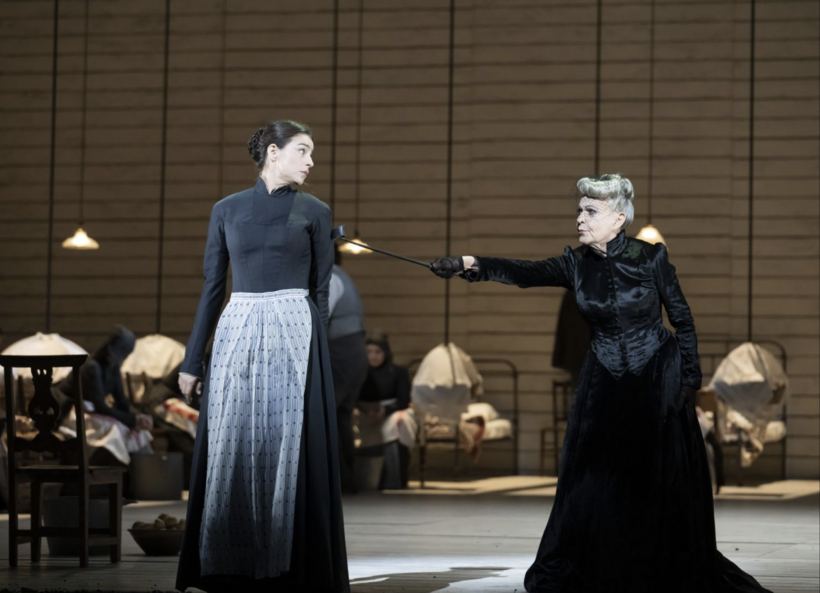Whose story is this, anyway? Beyond the borders of the Czech Republic, Janáček’s breakout opera—the third of nine—goes by the handle Jenůfa. It’s telling that at home, it’s called Její pastorkyňa (Her Stepdaughter). Both titles point to the same young mill worker, but the original title underscores her dependence on a righteous widow and caretaker of the village church known only as “the Kostelnička,” or Sextoness. In their musical demands and in the unfolding of the drama, both women are protagonists, equally matched.
Jenůfa, when we meet her in her strait-laced Moravian village, is engaged to a rich, vain, free-spending drunk. The Kostelnička knows the type all too well from her own marriage to Jenůfa’s late father. Furious at the groom’s latest excess, the Kostelnička intervenes. Unless he stays sober for a year, she declares for all to hear, the wedding is off. If only life weren’t so messy! There’s already a baby on the way. In concealment, the boy dies a tragic death, yet the opera ends in a burst of radiance for Jenůfa and a Plan B lover who have come through, against all expectation, to a dawn of new hope.
Postponed by the pandemic, the new production at the Royal Opera House unleashes two singing actresses of a stellar order. Asmik Grigorian, from Lithuania, sings Jenůfa in a robust yet ever-transparent soprano that mirrors Jenůfa’s essential goodness. Petite of stature, Grigorian resembles a sparrow, yet she’s an eagle inside, electric in phrase and gesture.

A wild swan is the bird her Junoesque Finnish colleague Karita Mattila looks like, yet in action this one’s an eagle, too. Formerly an incandescent Jenůfa, Mattila has owned the Kostelnička’s part since 2016, when she first took it on in San Francisco. In London, as foils to each other, the two sopranos are making operatic history.
For all the Kostelnička’s moral authority, it’s a man’s world in the Moravian hinterlands. Customarily cast in more likable roles, the tenor Saimir Pirgu, from Albania, dives deep into Števa, the unshaven, spineless good-time Charlie who leaves Jenůfa in the lurch. From Scotland, the hulking Nicky Spence, another tenor, plays Števa’s half-brother Laca, condemned to the life of a common laborer. Bitter, violent under pressure, Laca is the better man, unwavering in his devotion to Jenůfa, even in her disgrace. The conductor Henrik Nánási, from Hungary, renders Janáček’s score in all its novelistic originality, from its opening jitters to hymnic grandeur at the close, keenly sensitive to the splashes of folk melody and the pregnant silences along the way.
Claus Guth’s spare production retains next to nothing of the regional realism to which Janáček subscribed. Only a few costume touches hint at the Slavic locale. The stage is a mostly empty space, with directorial distractions at a blessed minimum. Yet the social and psychological detail gives us plenty to watch, focusing our attention just where it ought to be: on the characters’ inner lives. One stage picture you won’t forget is the giant raven on the roof of the Kostelnička’s lonely cottage in the woods—here not much more than a chicken coop. The silent flock of Puritan women in silhouette may haunt you, too, spying from under coal-scoop bonnets straight out of The Handmaid’s Tale.
Jenůfa is available on the OperaVision Web site through November 9
Matthew Gurewitsch writes about opera and classical music for AIR MAIL. He lives in Hawaii

